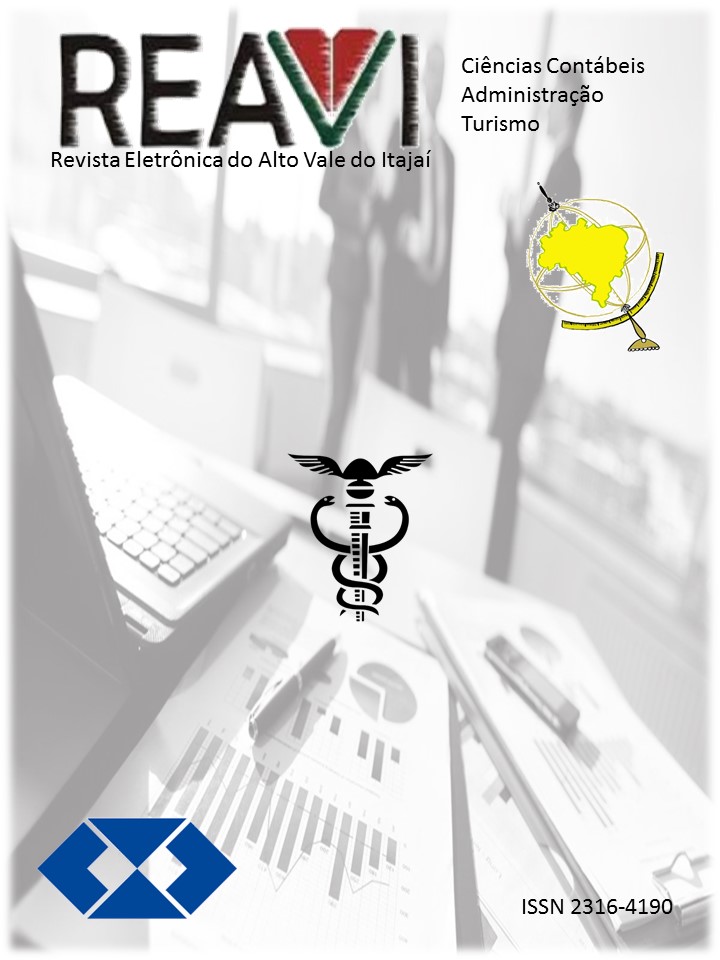Impactos financeiros e tributários decorrentes da adequação à geração do Bloco K em uma indústria automotiva
DOI:
https://doi.org/10.5965/2316419007102018062Palavras-chave:
sped fiscal, adequação, impacto financeiro, Bloco K, impacto tributárioResumo
A partir da implementação do Sistema Público de Escrituração Digital – SPED, diversos livros contábeis e fiscais começaram a ser emitidos de forma eletrônica, em um formato digital específico e padronizado. Diante disso, o presente estudo teve como objetivo verificar os impactos financeiros e tributários em uma indústria do setor automotivo para adequar-se ao EFD/Sped Fiscal, especialmente na geração do Bloco K. Em termos metodológicos, trata-se de um estudo de caso, descritivo, de natureza qualitativa. Neste estudo, foram evidenciados quais foram os custos necessários, como treinamento de pessoas, adequação de sistema de software e principalmente revisão de processos internos, para maior controle de estoque, estrutura de produto e reclassificação fiscal de acordo com as normas legais. Também foi possível demostrar alguns impactos tributários que com a entrega do arquivo do Bloco K, o que demanda cada vez mais responsabilidade com sua escrita fiscal. Ao final, concluiu-se que essa nova obrigação foi positiva para a empresa em estudo, visto que sua adequação gerou melhorias nas rotinas e fluxos organizacionais.Downloads
Referências
ALEXANDRE, Ricardo. Direito Tributário Esquematizado. 4. ed. São Paulo: Método, 2010.
AZEVEDO, Osmar R.; MARIANO, Paulo A. SPED - Sistema Público de Escrituração Digital. São Paulo: IOB, 2009.
BALAKRISHNAN, Karthik; BLOUIN, Jennifer; GUAY, Wayne. Tax Aggressiveness and Corporate Transparency. The Accounting Review, v. 93, n. 4, in-press, 2018.
BRASIL, Ajuste Sinief Nº 2 de 21 de dezembro de 1972. Disponível em: https://www.confaz.fazenda.gov.br/legislacao/ajustes/1972/aj_002_72: Acesso em 27 abr. 2016.
BRASIL, Ajuste Sinief Nº 2 de 3 de abril de 2009. Disponível em: http://www.normaslegais.com.br/legislacao/ajustesinief2_2009.html: Acesso em 27 abr. 2016.
BRASIL, Ajuste Sinief Nº 13 de 11 de dezembro de 2015. Disponível em: https://www.confaz.fazenda.gov.br/legislacao/ajustes/2015/ajuste-sinief-13-15: Acesso em 27 abr. 2016.
BRASIL, Constituição da República Federativa do Brasil de 1998. Disponível em: http://www.planalto.gov.br/ccivil_03/constituicao/ConstituicaoCompilado.html: Acesso em 24 dez. 2015.
BRASIL, Decreto Nº 6.022 de 22 de janeiro 2007. Disponível em: http://www.planalto.gov.br/ccivil_03/_ato20072010/2007/Decreto/D6022.html: Acesso em 25 nov. 2015.
BRASIL, Instrução Normativa RFB Nº 787 de 19 de novembro de 2007. Disponível em: http://www.receita.fazenda.gov.br/legislacao/Ins/2007/in7872007.htm: Acesso em 24 dez. 2015.
FABRETTI, Láudio Camargo. Contabilidade Tributária. 7. ed. São Paulo: Atlas, 2001. FACHIN, Odília. Fundamentos de metodologia. 4.ed. São Paulo: Saraiva, 2003.
GIL, Antonio Carlos. Como elaborar projetos de pesquisa. 5.ed. São Paulo: Atals, 2010.
OLIVEIRA, Fabrício Augusto. A evolução da estrutura tributária e do fisco brasileiro: 1889- 2009. Brasília: IPEA, 2010.
PUTRA, Pasca Dwi; SYAH, Dedy Husrizal; SIREGAR, Ina Namora Putri. Tax avoidance: evidence of tax planning in industrial companies in Indonesia Stock Exchange. In: The 1st Unimed International Conference On Economics And Business – UNICEB. Medan 2017.
RECEITA FEDERAL DO BRASIL. Guia Prático da Escrituração Fiscal Digital – EFD ICMS/IPI. Disponível em: http://www1.receita.fazenda.gov.br/sistemas/sped-fiscal/download/GUIA_PRATICO_EFD_ICMS_IPI_Versao2.0.14.pdf. Acesso em: 28 abr. 2016.
SANTOS, Renata Santana. Bloco K – EFD, Apresentação Bloco K em PDF. Espirito Santo, CRC/ES, jun.2015. Disponível em: http://www.ibefpr.com.br/down/ApresentacaoBlocoKIBEF17-6-15_PWC.pdf.Acesso em 28 abr. 2016.
YIN,Robert K.Pesquisa estudo de caso.4.ed.Vol.5. Sage PublicationsInc., EUA, 1989.
Downloads
Publicado
Como Citar
Edição
Seção
Licença
Copyright (c) 2018 REAVI - Revista Eletrônica do Alto Vale do Itajaí

Este trabalho está licenciado sob uma licença Creative Commons Attribution 4.0 International License.














